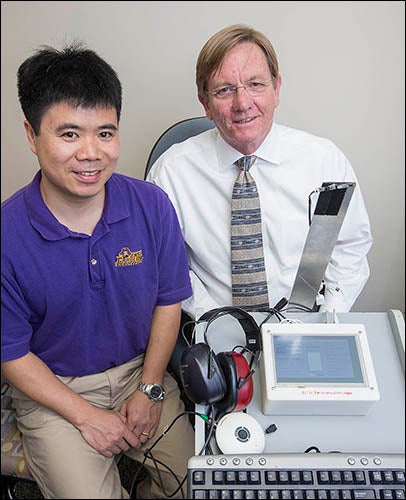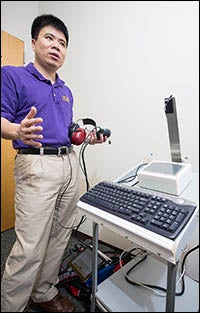AUDIOLOGY FROM AFAR
ECU research enables remote hearing exams

ECU professors Dr. Jason Yao, left, and Dr. Gregg Givens collaborated on a device that will enable remote hearing tests. (Photos by Cliff Hollis)
An East Carolina University researcher hit a milestone this spring in his ongoing work to develop software and portable hardware that will enable audiologists to conduct hearing tests remotely.
Dr. Jason Yao, an associate professor in the Department of Engineering, has created software that enables an audiologist to see a patient and conduct two types of hearing tests via web site. His work builds on the research of Dr. Gregg Givens, an audiologist and chair of ECU’s Department of Communication Sciences and Disorders.
“What this system does is allow us to remotely assess hearing through basic server-based or cloud-based technology. That’s the unique aspect of this,” Givens said. “There is no other system like this in the world. The importance is to reach people who don’t have hearing health care. With this system, neither the audiologist nor the patient has to have a computer.”
With Yao’s software, a patient needs a qualified person to facilitate the testing, an audiometer – a piece of hearing test equipment the size of a saucer – and the portable console device Yao built. That device consists of a small rectangular box that relays the data between the patient and medical site. In the prototype, it’s hooked to a webcam and keyboard so the patient and audiologist can easily communicate during the test. Eventually, the device will be about as thin as an iPhone, Yao said.
Implementing the research could bring convenient, preventative medical care to people in rural or remote areas and underserved populations.
“We were looking to duplicate exactly what’s going on in the doctor’s office,” Givens said.
Yao and Givens’ work is funded, in part, as a pilot project for Operation Re-entry North Carolina. With this technology, returning soldiers could be tested for hearing deficiencies – often a result of proximity to bombing and gunfire – without coming to campus.
“Traditionally, a patient has to go to the hospital,” he said. “Now they can stay at home or go somewhere close.”
Other potential users of the technology are school or health care systems and prisons, where transportation costs for inmates could be reduced by remote hearing tests, Givens said.

Yao demonstrates how the new equipment works to facilitate remote hearing exams.
Givens applauded the work of Yao and the cross-campus partnership.
“Jason has taken this project from first base to home plate,” Givens said. “It was a very different system before Jason got ahold of it.”
Likewise Yao said Givens has been a pioneer in telemedicine through innovations in audiology over the past 20 years. Givens, who has received multiple patents for his work, said the timing is right for mobile computing. While connectivity has improved, it is vital to the success of remote hearing tests.
“Engineering is something where you can create things to help people’s lives,” Yao added.
The software is currently housed on a server in the College of Technology and Computer Science. The hardware prototype was transported March 29 to Givens in the College of Allied Health Sciences for testing.
A preliminary test was successfully done last year between audiology doctoral student, Kaila Higuchi, who was in Greenville, and Yao, who was in China. Testing and modifications will be done for at least another year, Givens said. Higuchi also recently received a 2013-2014 fellowship through Operation Re-entry for her work on the project.
Yao is assisted in his research by Dr. Daoyuan Yao, a post-doctoral scholar also in the Department of Engineering.